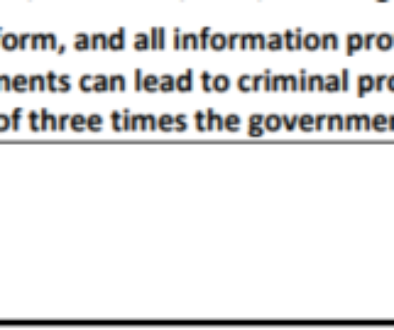Lately, I have been getting a lot of calls with a similar theme, so I figured I would offer my thoughts for all to read again (I have addressed this issue is past articles). Most of the calls about this particular topic go something like this: “I talked to this other consulting firm who claims the right way to do an OIC is to sell my business to a friend, a business associate, or a corporation owned by me. Something about that doesn’t sound right, so I wanted to speak with someone else who offers these kinds of services.”
After I am done shaking my head, my response is always the same: If the purpose of your action is to dupe the bank and the SBA into thinking your business has been sold or closed, knowing full well that you intend to re-acquire the business or business assets, that is fraud. Plain and simple. I’ll repeat that. It’s fraud. It’s not a loophole. It’s not a “sophisticated workout strategy”. It’s fraud.
So now your head is spinning. Those guys are saying one thing, I’m saying another. Who to believe? Here are my arguments for you to consider.
1) If the SBA and banks were agreeable to this sort of idea, wouldn’t it just be easier to write down the loan balance? In other words, if this were a legit strategy that lenders are willing to get on board with, why the need to jump through these hoops? The answer is simple: if the SBA and bank knew that the relationship between the seller of the business and the buyer of the business was NOT arm’s length, they would have some serious reservations. If they knew that your sole reason for engaging in the sale is to temporarily transfer ownership so that an OIC could be negotiated, they would definitely reject the sale.
2) If this were a legit way to get your debt reduced, why doesn’t everyone do it? For the most part, people realize there is not something quite right about the whole concept, so the conversation ends there. Are there some people who try it and get away with it? Probably. Are there people who get caught and end up worse off than when they started? Absolutely. Conveniently for the consultant, it’s the borrower who is left holding the bag.
Overall, I firmly believe that the right way to settle debt is to be forthright and honest, and after doing this for number of years, truly believe that fair and reasonable settlements can still be achieved without resorting to deception. There is a world of difference between putting a positive spin on a situation, and blatantly lying. I once heard a good quote that sums it up nicely: the great thing about telling the truth is that you never have to worry about which version of your story you previously told.
If you’d like to schedule a case evaluation, you can choose a date and time here. We’ll discuss your SBA loan situation, and I’ll lay out your options.


